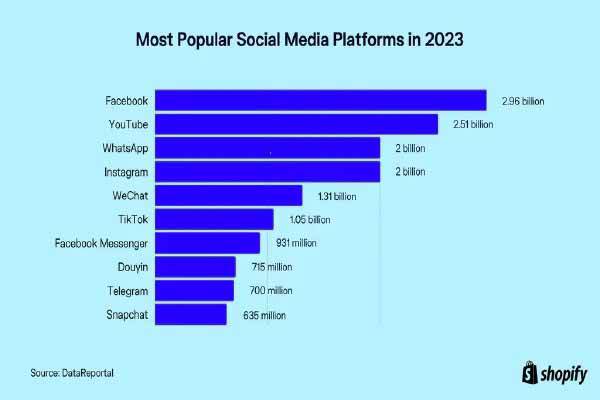 Contact
About Us
Articles
Home
Contact
About Us
Articles
Home

It is hard to fathom the speed with which social media has transformed our public and private discourse — for bad and for worse. The origins of social media started with Myspace in 2003. Myspace grew to over 25 million users, but a new company, Facebook, quickly surpassed Myspace in 2008.
Since then, other social media platforms have continued evolving and faced increased scrutiny. Used wisely and with limits in mind, social media can have many benefits. For older adults, social media can mean the difference between a life of isolation or one rich with possibility. Not only older adults can benefit from social media if used wisely. We will explore some of the more popular social media platforms and how to use them responsibly.
You can look at social media as having seven general purposes:
Each social media platform can have several purposes and uses. Some sites may share news, sell products and connect people. Others may offer closed communication groups such as the app WhatsApp. Here are the top 10 social media sites. These numbers are per month users in 2023 according to Shopify:

As you can see, Facebook still rules, but YouTube is just a little behind. Other social media platforms include Pinterest, with about 450 million users; Reddit, with 430 million; LinkedIn, with 900 million; and Twitter, with 556 million.
The benefits of social media for older adults can be significant. The challenge can be choosing platforms that most fulfill a person’s needs. If you are assisting someone with learning how to use a social media platform, first ask them these questions:
Be ready with some suggestions and ideas about how to get started without the process being overwhelming. Here are some of the benefits of social media for older adults:
Connecting with family and friends may be one of the main reasons older adults gravitate to social media platforms like Facebook. Social isolation has significant negative emotional and physical consequences for older adults, including depression and anxiety.
When someone cannot drive or easily access family, it can be a great comfort to see pictures and keep updated on what kids, grandkids and other relatives are doing. Beyond family, it is possible to make new friend connections while using caution. Online groups are another source of connection.
Many older adults want to work part-time during retirement or volunteer or both. For some, starting a new business or pivoting from previous employment is the goal. It is easier to imagine accomplishing any of these with social media. Networking, developing an employment profile and inquiring about jobs requires some tech savvy in this competitive job market. LinkedIn, in particular, is considered the go-to employment site, and you can set it to alert you to available jobs.
Almost every company, agency and organization advertises jobs and volunteer opportunities on social media.
Entrepreneurs who want a side gig can use paid advertising on Facebook or sell products on Etsy. Many people can self-design websites through WordPress, Squarespace or Wix. Or, you may want to advertise your services and expertise on several social media sites.
Social media is overflowing with information, and most major news outlets are on social media. It is possible to become educated about any subject you can imagine. Your interests could be caregiving, travel, art, learning a new language, health, exploring virtual groups, or even participating in therapy online.
And then there is YouTube. YouTube is the preeminent site to learn how to repair or make almost anything. The advantage of video teaching is the added benefit of a verbal explanation with hands-on instruction. You can fix your computer issue, repair your vacuum, learn pickleball, find an exercise program for your ability or figure out your new iPhone. And that part of YouTube is free.
Many, but not all, older adults struggle with technology. But the mental benefits are rewarding once past the fears and challenges. Learning anything new stimulates new neural pathways and can improve memory. Moreover, working through these challenges can increase confidence in other areas.

The pitfalls and problems of social media continue to grow and, unfortunately, divide people. Regulation of social media is a hotly contested issue. On the one hand, some people want to stem the tide of false information, but then others don’t want to limit free speech. It appears that more government regulation of social media may be inevitable. A bipartisan bill passed that banned TikTok from government devices because TikTok is Chinese-owned. False or misleading information is probably one of the biggest problems with social media. But there are others.
Criminals work full-time to steal people’s money and identity; social media is a prime platform for achieving this. One of the most common scams is the “Granny Scam.” A criminal gathers information about a grandchild from social media and then pretends to be the family member who needs money to help with something. Because older adults are generally more trusting, they often turn the money over to the person thinking it is their grandchild. The perpetrator may know the name of the grandchild, where they go to school, and parents’ and siblings’ names. Educate your loved one by doing the following:
Romance scams are straightforward and effective. Someone reaches out to your older loved one and starts a friendship that evolves into a romance. Once the criminal establishes trust, they will ask for money to help with short-term problems. But then the requests get bigger. Seniors have lost their life savings from romance scams.
Using social media responsibly to connect with others and stay informed is one thing. But too much social media use has been linked to depression and increasing isolation – the very thing it is meant to prevent. There is no replacement for face-to-face human contact or a phone conversation when possible.
False information is rampant on social media, and families have been broken apart because of it. Check in with your loved one about their reading and discuss current events. Try and guide them to reliable and verifiable news sources.
If you feel that an older adult is spending too much time at the expense of other activities, talk with them about possible solutions to the problem. Suggest the following to them:
AI is defined as the ability of a digital computer or computer-controlled robot to perform tasks commonly associated with intelligent humans. You may think of AI as something that is futuristic or not involved in your daily life. In fact, you already use AI for map navigation, chatbots, editing programs, search engines, and the advertising and suggested connections and content you see on social media.
Currently, advanced forms of AI can compile vast quantities of data and write articles or answer specific questions with one detailed answer. However, some of the information you receive may be incorrect. The glitches of advanced AI will be worked out, but as always, be wary of all information you receive on social media since AI may generate more and more of it. AI can even accurately replicate great works of art. Other purposes of AI:
Helping an older adult access social media may start with teaching them how to use technology. You could start with a computer, tablet or smartphone. A tablet can be a good place to begin, given the portability and simplicity of using one. Apart from that, we have some suggestions on how to assist an older adult, or even someone else in your family, to access and manage social media responsibly.
Teaching technology to an older adult who doesn’t have experience or practice can be daunting. It will take time. If possible, enlist the help of a grandchild, which has the added benefit of creating some quality time together. Break down teaching sessions into several separate episodes. Mental fatigue can impede learning and create more frustration. Many senior centers have classes in social media use.
Do you or your family member need several social media apps? Probably not. Find out where most of the relevant information is and what friends and family are using. Start with one, such as Facebook, and then go from there. You can always add more later.
The first step after establishing a profile is to go to security settings and ensure that you have set up two-factor authentication. Yes, it can be annoying and time-consuming, but worth it. Also, have conversations about scams – what to look for and how to recognize illicit inquiries. Ask your family member to contact you if they are in doubt about any suspicious activity.
Social media is everywhere and, despite its problems, can help an older adult feel that they are part of their community and the world at large. Approach the journey with a dose of caution but also with the joy of discovering and engaging with family and friends.
Alliance America is an insurance and financial services company dedicated to the art of personal financial planning. Our financial professionals can assist you in maximizing your retirement resources and achieving your future goals. We have access to an array of products and services, all focused on helping you enjoy the retirement lifestyle you want and deserve. You can request a no-cost, no-obligation consultation by calling (833) 219-6884 today.


